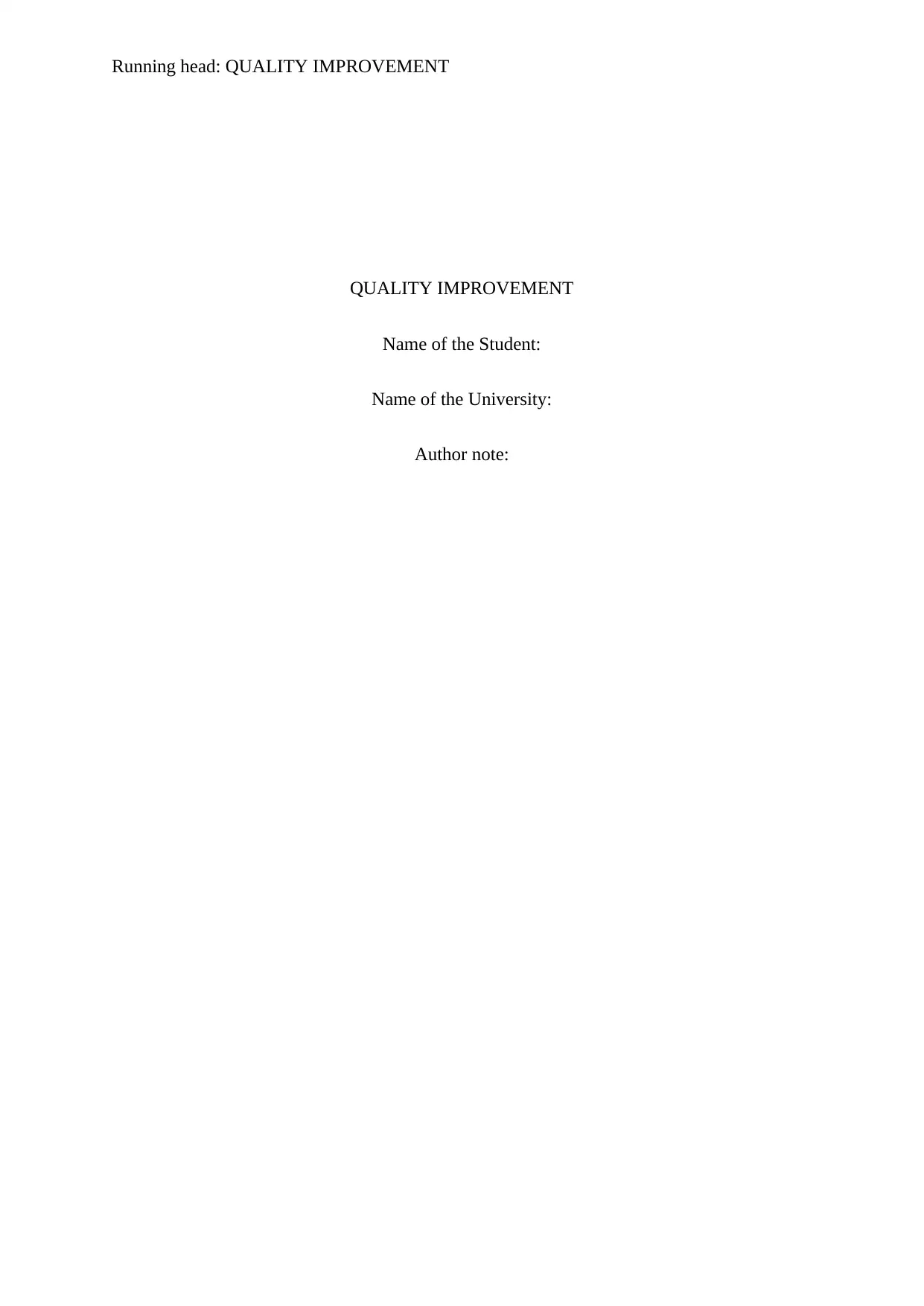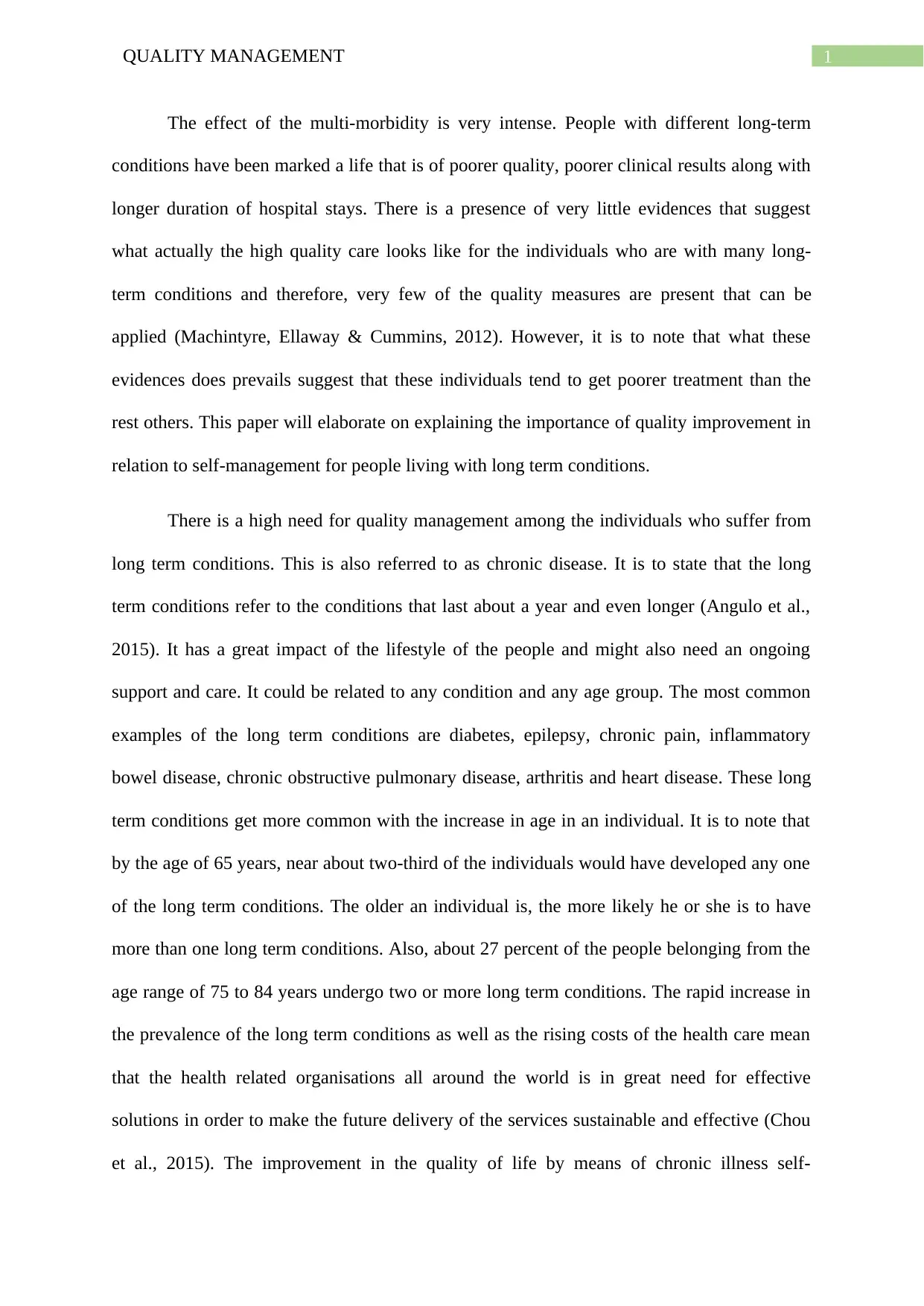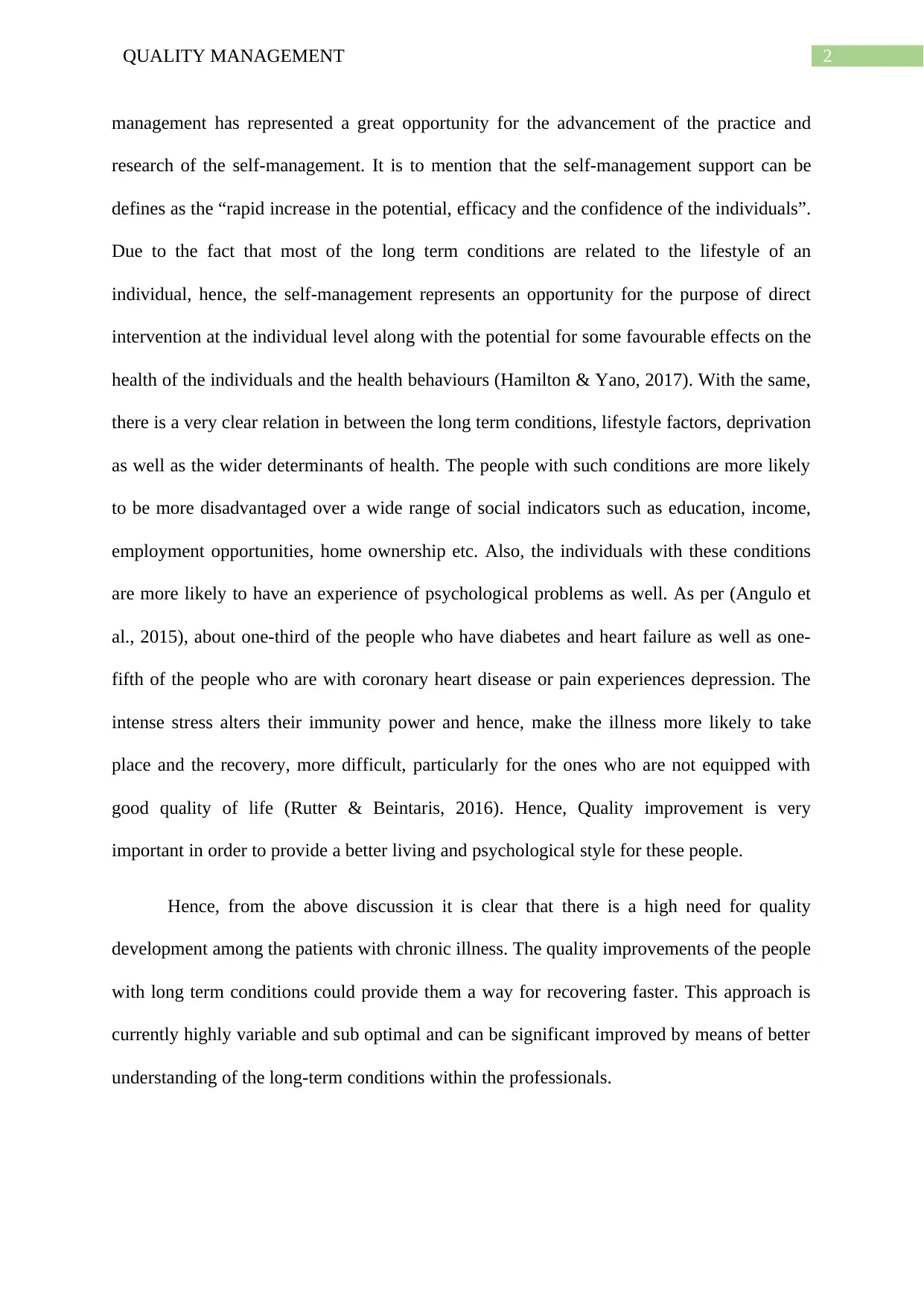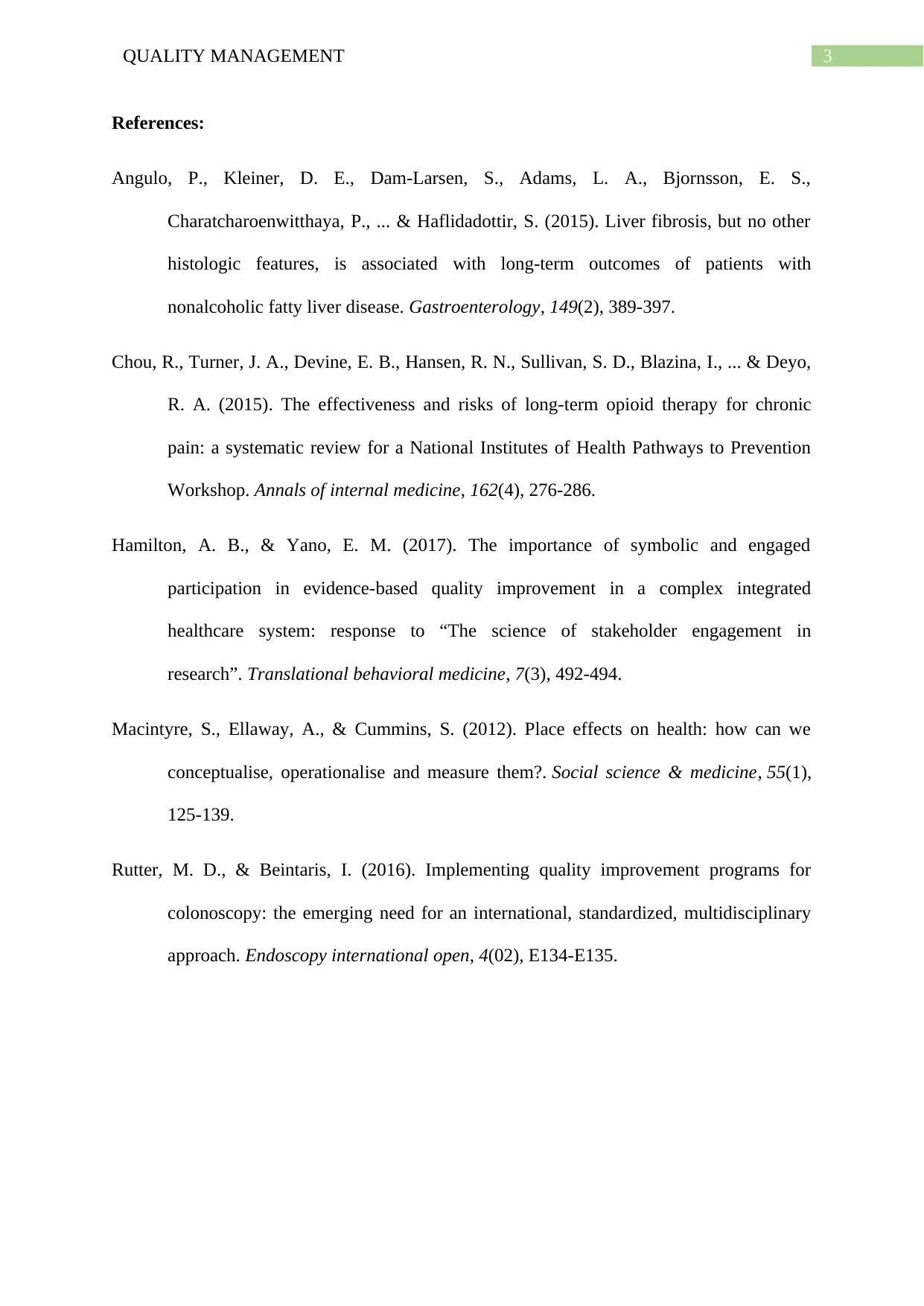Exploring Quality Improvement for Long-Term Conditions: A Review
VerifiedAdded on 2023/06/07
|4
|1111
|477
Essay
AI Summary
This essay highlights the critical need for quality improvement in the self-management of long-term conditions, also known as chronic diseases, which affect individuals of all ages and require ongoing support. It emphasizes that individuals with multiple long-term conditions often experience poorer quality of life and clinical outcomes, despite evidence suggesting they receive inadequate treatment. The paper underscores the potential of self-management support to improve health behaviors and outcomes, especially considering the strong link between lifestyle factors, socioeconomic disadvantage, and psychological well-being in individuals with chronic illnesses. Ultimately, the essay advocates for quality improvement initiatives to enhance the overall living and psychological well-being of individuals managing long-term conditions, suggesting that a deeper understanding of these conditions among healthcare professionals is essential for optimal care.

Running head: QUALITY IMPROVEMENT
QUALITY IMPROVEMENT
Name of the Student:
Name of the University:
Author note:
QUALITY IMPROVEMENT
Name of the Student:
Name of the University:
Author note:
Paraphrase This Document
Need a fresh take? Get an instant paraphrase of this document with our AI Paraphraser

1QUALITY MANAGEMENT
The effect of the multi-morbidity is very intense. People with different long-term
conditions have been marked a life that is of poorer quality, poorer clinical results along with
longer duration of hospital stays. There is a presence of very little evidences that suggest
what actually the high quality care looks like for the individuals who are with many long-
term conditions and therefore, very few of the quality measures are present that can be
applied (Machintyre, Ellaway & Cummins, 2012). However, it is to note that what these
evidences does prevails suggest that these individuals tend to get poorer treatment than the
rest others. This paper will elaborate on explaining the importance of quality improvement in
relation to self-management for people living with long term conditions.
There is a high need for quality management among the individuals who suffer from
long term conditions. This is also referred to as chronic disease. It is to state that the long
term conditions refer to the conditions that last about a year and even longer (Angulo et al.,
2015). It has a great impact of the lifestyle of the people and might also need an ongoing
support and care. It could be related to any condition and any age group. The most common
examples of the long term conditions are diabetes, epilepsy, chronic pain, inflammatory
bowel disease, chronic obstructive pulmonary disease, arthritis and heart disease. These long
term conditions get more common with the increase in age in an individual. It is to note that
by the age of 65 years, near about two-third of the individuals would have developed any one
of the long term conditions. The older an individual is, the more likely he or she is to have
more than one long term conditions. Also, about 27 percent of the people belonging from the
age range of 75 to 84 years undergo two or more long term conditions. The rapid increase in
the prevalence of the long term conditions as well as the rising costs of the health care mean
that the health related organisations all around the world is in great need for effective
solutions in order to make the future delivery of the services sustainable and effective (Chou
et al., 2015). The improvement in the quality of life by means of chronic illness self-
The effect of the multi-morbidity is very intense. People with different long-term
conditions have been marked a life that is of poorer quality, poorer clinical results along with
longer duration of hospital stays. There is a presence of very little evidences that suggest
what actually the high quality care looks like for the individuals who are with many long-
term conditions and therefore, very few of the quality measures are present that can be
applied (Machintyre, Ellaway & Cummins, 2012). However, it is to note that what these
evidences does prevails suggest that these individuals tend to get poorer treatment than the
rest others. This paper will elaborate on explaining the importance of quality improvement in
relation to self-management for people living with long term conditions.
There is a high need for quality management among the individuals who suffer from
long term conditions. This is also referred to as chronic disease. It is to state that the long
term conditions refer to the conditions that last about a year and even longer (Angulo et al.,
2015). It has a great impact of the lifestyle of the people and might also need an ongoing
support and care. It could be related to any condition and any age group. The most common
examples of the long term conditions are diabetes, epilepsy, chronic pain, inflammatory
bowel disease, chronic obstructive pulmonary disease, arthritis and heart disease. These long
term conditions get more common with the increase in age in an individual. It is to note that
by the age of 65 years, near about two-third of the individuals would have developed any one
of the long term conditions. The older an individual is, the more likely he or she is to have
more than one long term conditions. Also, about 27 percent of the people belonging from the
age range of 75 to 84 years undergo two or more long term conditions. The rapid increase in
the prevalence of the long term conditions as well as the rising costs of the health care mean
that the health related organisations all around the world is in great need for effective
solutions in order to make the future delivery of the services sustainable and effective (Chou
et al., 2015). The improvement in the quality of life by means of chronic illness self-

2QUALITY MANAGEMENT
management has represented a great opportunity for the advancement of the practice and
research of the self-management. It is to mention that the self-management support can be
defines as the “rapid increase in the potential, efficacy and the confidence of the individuals”.
Due to the fact that most of the long term conditions are related to the lifestyle of an
individual, hence, the self-management represents an opportunity for the purpose of direct
intervention at the individual level along with the potential for some favourable effects on the
health of the individuals and the health behaviours (Hamilton & Yano, 2017). With the same,
there is a very clear relation in between the long term conditions, lifestyle factors, deprivation
as well as the wider determinants of health. The people with such conditions are more likely
to be more disadvantaged over a wide range of social indicators such as education, income,
employment opportunities, home ownership etc. Also, the individuals with these conditions
are more likely to have an experience of psychological problems as well. As per (Angulo et
al., 2015), about one-third of the people who have diabetes and heart failure as well as one-
fifth of the people who are with coronary heart disease or pain experiences depression. The
intense stress alters their immunity power and hence, make the illness more likely to take
place and the recovery, more difficult, particularly for the ones who are not equipped with
good quality of life (Rutter & Beintaris, 2016). Hence, Quality improvement is very
important in order to provide a better living and psychological style for these people.
Hence, from the above discussion it is clear that there is a high need for quality
development among the patients with chronic illness. The quality improvements of the people
with long term conditions could provide them a way for recovering faster. This approach is
currently highly variable and sub optimal and can be significant improved by means of better
understanding of the long-term conditions within the professionals.
management has represented a great opportunity for the advancement of the practice and
research of the self-management. It is to mention that the self-management support can be
defines as the “rapid increase in the potential, efficacy and the confidence of the individuals”.
Due to the fact that most of the long term conditions are related to the lifestyle of an
individual, hence, the self-management represents an opportunity for the purpose of direct
intervention at the individual level along with the potential for some favourable effects on the
health of the individuals and the health behaviours (Hamilton & Yano, 2017). With the same,
there is a very clear relation in between the long term conditions, lifestyle factors, deprivation
as well as the wider determinants of health. The people with such conditions are more likely
to be more disadvantaged over a wide range of social indicators such as education, income,
employment opportunities, home ownership etc. Also, the individuals with these conditions
are more likely to have an experience of psychological problems as well. As per (Angulo et
al., 2015), about one-third of the people who have diabetes and heart failure as well as one-
fifth of the people who are with coronary heart disease or pain experiences depression. The
intense stress alters their immunity power and hence, make the illness more likely to take
place and the recovery, more difficult, particularly for the ones who are not equipped with
good quality of life (Rutter & Beintaris, 2016). Hence, Quality improvement is very
important in order to provide a better living and psychological style for these people.
Hence, from the above discussion it is clear that there is a high need for quality
development among the patients with chronic illness. The quality improvements of the people
with long term conditions could provide them a way for recovering faster. This approach is
currently highly variable and sub optimal and can be significant improved by means of better
understanding of the long-term conditions within the professionals.
⊘ This is a preview!⊘
Do you want full access?
Subscribe today to unlock all pages.

Trusted by 1+ million students worldwide

3QUALITY MANAGEMENT
References:
Angulo, P., Kleiner, D. E., Dam-Larsen, S., Adams, L. A., Bjornsson, E. S.,
Charatcharoenwitthaya, P., ... & Haflidadottir, S. (2015). Liver fibrosis, but no other
histologic features, is associated with long-term outcomes of patients with
nonalcoholic fatty liver disease. Gastroenterology, 149(2), 389-397.
Chou, R., Turner, J. A., Devine, E. B., Hansen, R. N., Sullivan, S. D., Blazina, I., ... & Deyo,
R. A. (2015). The effectiveness and risks of long-term opioid therapy for chronic
pain: a systematic review for a National Institutes of Health Pathways to Prevention
Workshop. Annals of internal medicine, 162(4), 276-286.
Hamilton, A. B., & Yano, E. M. (2017). The importance of symbolic and engaged
participation in evidence-based quality improvement in a complex integrated
healthcare system: response to “The science of stakeholder engagement in
research”. Translational behavioral medicine, 7(3), 492-494.
Macintyre, S., Ellaway, A., & Cummins, S. (2012). Place effects on health: how can we
conceptualise, operationalise and measure them?. Social science & medicine, 55(1),
125-139.
Rutter, M. D., & Beintaris, I. (2016). Implementing quality improvement programs for
colonoscopy: the emerging need for an international, standardized, multidisciplinary
approach. Endoscopy international open, 4(02), E134-E135.
References:
Angulo, P., Kleiner, D. E., Dam-Larsen, S., Adams, L. A., Bjornsson, E. S.,
Charatcharoenwitthaya, P., ... & Haflidadottir, S. (2015). Liver fibrosis, but no other
histologic features, is associated with long-term outcomes of patients with
nonalcoholic fatty liver disease. Gastroenterology, 149(2), 389-397.
Chou, R., Turner, J. A., Devine, E. B., Hansen, R. N., Sullivan, S. D., Blazina, I., ... & Deyo,
R. A. (2015). The effectiveness and risks of long-term opioid therapy for chronic
pain: a systematic review for a National Institutes of Health Pathways to Prevention
Workshop. Annals of internal medicine, 162(4), 276-286.
Hamilton, A. B., & Yano, E. M. (2017). The importance of symbolic and engaged
participation in evidence-based quality improvement in a complex integrated
healthcare system: response to “The science of stakeholder engagement in
research”. Translational behavioral medicine, 7(3), 492-494.
Macintyre, S., Ellaway, A., & Cummins, S. (2012). Place effects on health: how can we
conceptualise, operationalise and measure them?. Social science & medicine, 55(1),
125-139.
Rutter, M. D., & Beintaris, I. (2016). Implementing quality improvement programs for
colonoscopy: the emerging need for an international, standardized, multidisciplinary
approach. Endoscopy international open, 4(02), E134-E135.
1 out of 4
Related Documents
Your All-in-One AI-Powered Toolkit for Academic Success.
+13062052269
info@desklib.com
Available 24*7 on WhatsApp / Email
![[object Object]](/_next/static/media/star-bottom.7253800d.svg)
Unlock your academic potential
Copyright © 2020–2026 A2Z Services. All Rights Reserved. Developed and managed by ZUCOL.





